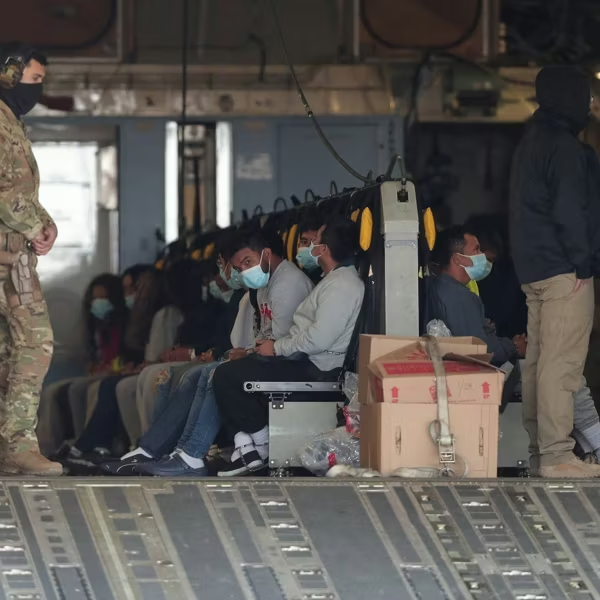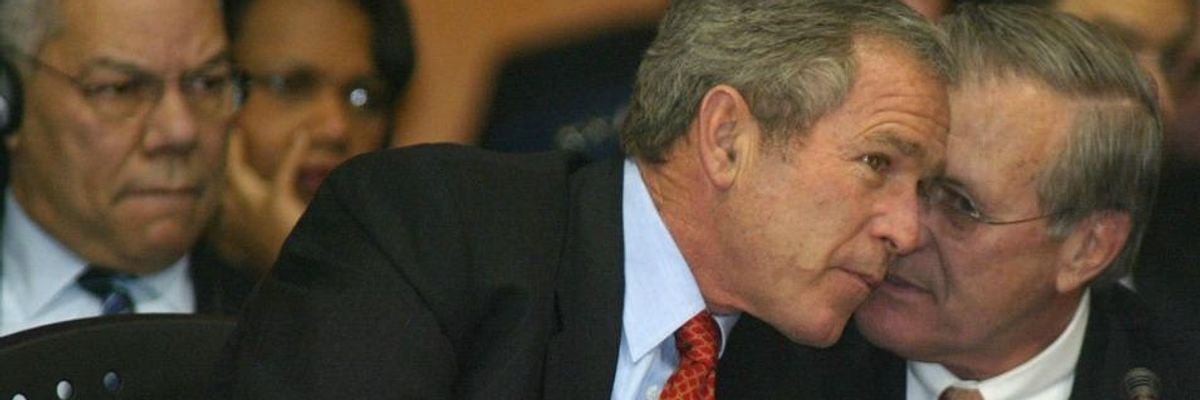Since the terrible elevation of the grotesquely inadequate figure of Donald Trump to the position of President of the United States, there has been a bizarre propensity, on the part of those in the center and on the left of US political life, to seek to rehabilitate the previous Republican president, George W. Bush.
So let's nip this in the bud, shall we? Because unless you've been away from the planet for the last 20 years, you must be aware that it was George W. Bush who initiated the US's brutal and thoroughly counter-productive "war on terror" in the wake of the terrorist attacks of September 11, 2001, which involved authorizing the CIA to set up a secret detention and torture program, establishing a prison outside the law at Guantanamo Bay, Cuba, establishing deportation and surveillance programs within the US, invading one country (Afghanistan) in response to the attacks, where US troops remain to this day, despite having long ago "snatched defeat from the jaws of victory," as the author Anand Gopal once explained to me, and invading another country (Iraq) that had nothing to do with 9/11 or al-Qaeda, but which was nevertheless destroyed, along the way serving as the crucible for the creation of a newer threat, Daesh, or Islamic State, as it is more colloquial known in the West, a kind of turbo-charged reincarnation of al-Qaeda.
Today, February 7, is the 16th anniversary of one particularly sinister and misguided development in Bush's "war on terror" -- a memorandum, entitled, "Humane Treatment of Taliban and al Qaeda Detainees," which was sent to just a handful of recipients including Vice President Dick Cheney, Secretary of Defense Donald Rumsfeld, Secretary of State Colin Powell, Attorney General John Ashcroft, CIA director George Tenet, and General Richard B. Myers, the Chairman of the Joint Chiefs of Staff.
As I explained in an article marking the 10th anniversary of the issuing of the memorandum, in February 2012, on the day itself the only mention of it came from Andrew Cohen in the Atlantic, who reminded readers that the heading of the memo "was a cruel irony, an Orwellian bit of business, because what the memo authorized and directed was the formal abandonment of America's commitment to key provisions of the Geneva Convention. This was the day, a milestone on the road to Abu Ghraib, that marked our descent into torture -- the day, many would still say, that we lost part of our soul."
As I proceeded to explain in my article:
This is no exaggeration. Depriving prisoners seized in wartime of the protections of the Geneva Conventions was a huge and unprecedented step, and thoroughly alarming. And yet, despite criticism from Secretary of State Colin Powell, the administration pushed forward remorselessly towards the creation of an America that practiced arbitrary detention and torture.
Powell had been included in the paper trail that led to President Bush's memorandum of February 7, 2002, and he was particularly upset by a memo on January 25, 2002, signed by White House Counsel Alberto Gonzales, but written by Vice President Dick Cheney's legal counsel, David Addington, which claimed that the "new paradigm," which, it was claimed, the "war on terror" presented, "renders obsolete Geneva's strict limitations on questioning of enemy prisoners and renders quaint some of its provisions."
In his memorandum, just two weeks later, President Bush declared that "none of the provisions of Geneva apply to our conflict with al-Qaeda in Afghanistan or elsewhere through the world, because, among other reasons, al-Qaeda is not a High Contracting Party to Geneva." He added, "I determine that the Taliban detainees are unlawful combatants and, therefore, do not qualify as prisoners of war under Article 4 of Geneva. I note that, because Geneva does not apply to our conflict with al-Qaeda, al-Qaeda detainees also do not qualify as prisoners of war."
This was the rationale for holding prisoners neither as criminal suspects or as prisoners of war, but as a third category of human being, without any rights, which was disturbing enough, but it also paved the way for the use of torture, as people with no rights whatsoever had no protection against torture and abuse, and to this end the most alarming passage in the memorandum is the President's claim that "common Article 3 of Geneva does not apply to either al-Qaeda or Taliban detainees because, among other reasons, the relevant conflicts are international in scope and common Article 3 applies only to 'armed conflict not of an international character.'"
President Bush claimed that the prisoners would be "treated humanely and, to the extent appropriate and consistent with military necessity, in a manner consistent with the principles of Geneva," but it was a meaningless addition. By refusing to accept that everyone seized in wartime must be protected from torture and abuse, and by removing the protections of common Article 3 from the prisoners, which prohibit "cruel treatment and torture," and "outrages upon personal dignity, in particular humiliating and degrading treatment," President Bush opened the floodgates to the torture programs that were subsequently developed, both for use by the CIA, and at Guantanamo.
16 years on, February 7, 2002 remains a grim day in the modern American calendar, and one that, I think, should be marked every year, along with other key dates -- August 1, 2002, for example, when the "torture memos," seeking to redefine torture so that it could be used by the CIA, were issued by the Justice Department's Office of Legal Counsel, written by John Yoo and approved by his boss, Jay Bybee, and December 2, 2002, when Donald Rumsfeld approved his own specific torture program for use at Guantanamo, which was initially intended for use on just one prisoner, Mohammed al-Qahtani, but which ended up being used on one in six of the prisoners, according to a former interrogator who spoke to Neil A. Lewis for a New York Times article in January 2005.
It is also important to remember that the torture and abuse that Bush unleashed in his memo of February 7, 2002 remained US policy for nearly four and half years, until the Supreme Court reminded the president, in Hamden v. Rumseld, on June 29, 2006, that Common Article 3 of the Geneva Conventions apply to all prisoners held by the US, whatever their location (theoretically, Common Article 3 was reinstated in the Detainee Treatment Act of 2005, but critics have suggested that that legislation, introduced by John McCain, had numerous loopholes that sidestepped its intended prohibition on the use of torture). Within three months of Hamdan v. Rumsfeld, on the other hand, demonstrating the Supreme Court's influence, Bush emptied the CIA's "black sites," bringing 14 "high-value detainees" to Guantanamo, where all but one of them remain to this day.
That wasn't quite the end of the US torture program, as a handful of other "high-value detainees" eventually washed up at Guantanamo, and, as Jeffrey Kaye in particular has noted, torture techniques remain in the Army Field Manual despite the fact that President Obama issued an executive order banning the use of torture when he took office in January 2009.
Significantly, in December 2014, a major step was taken against the use of torture, when the Senate Intelligence Committee issued the 500-page executive summary of a scathing 6,200-page report about both the brutality and the pointlessness of the CIA's torture program. Stung by this, almost the entire US establishment turned on Donald Trump when, during his first weeks in office, a draft executive order was leaked indicating that he wanted to revive the use of torture and of CIA "black sites."
That said, torture is less of an option than it used to be, as, under Barack Obama, the US moved away from the messy business of detention, embracing assassinations instead -- through drone attacks, which are, to be frank, as legally dubious as the Bush administration's rendition and torture program was. With hindsight, the immediate aftermath of the 9/11 attacks was a time when, as it was throughout the Clinton years, assassination had fallen out of favor, but it is now back with a vengeance, and the drone program is being enthusiastically pursued by Donald Trump.
And while it remains significant that Donald Trump seems to be getting away with his enthusiasm for killing people in drone attacks, it is also worth remembering, on this baleful anniversary, that, when it comes to torture, although the US establishment has generally retreated from endorsing its use (through recognizing how close they came to prosecutions, if not because of their recognition of the uselessness of torture), the US public, through shows like '24' and films like the disgraceful 'Zero Dark Thirty,' is not so well-informed.
As Donald Trump took office, 48% of Americans said that "there are some circumstances under which the use of torture is acceptable in US anti-terrorism efforts." Encouragingly, 49% disagreed, but it remains, i believe, a sign of the enduring power of the Bush administration's bellicose pro-torture maneuverings in the wake of the 9/11 attacks that torture remains so popular, just as, with Guantanamo, the dark propaganda of the priosn's early days -- as a place which, allegedly held "the worst of the worst" -- has proven alarmingly durable, despite relentless efforts by campaigners, myself included, to demonstrate its almost complete groundlessness.




